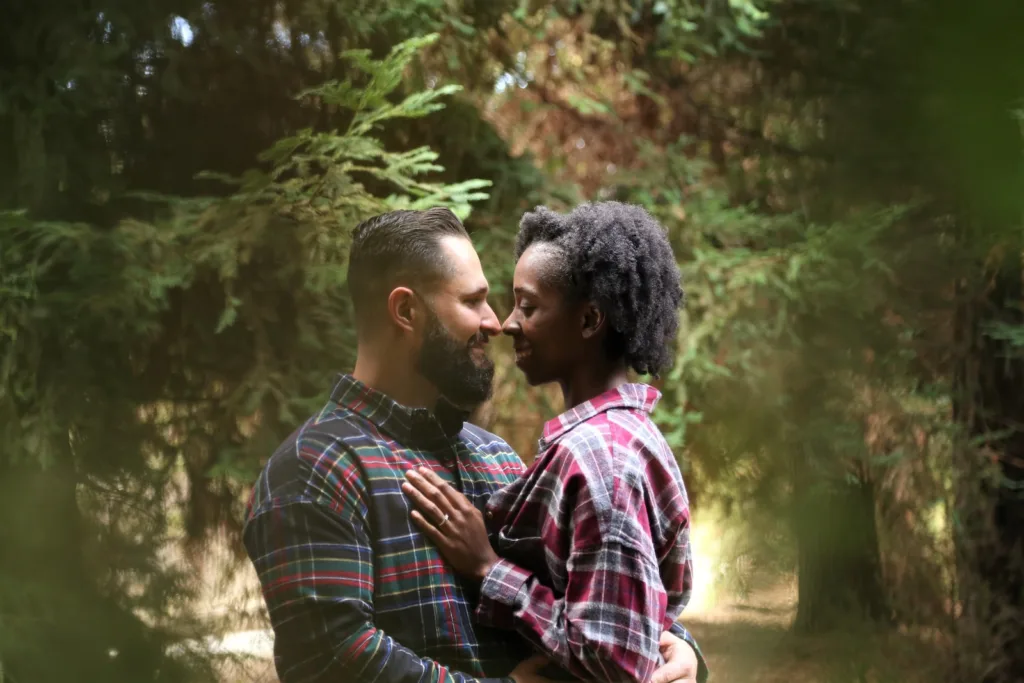Do you know people in interracial relationships or are you considering one?
While these relationships can be fulfilling and enriching, they can also face unique challenges, such as prejudice and discrimination from society. However, with the right strategies and support, you can build a strong, lasting bond.
One key factor in building a strong interracial relationship is resilience. This means being able to handle conflict, overcome obstacles, and bounce back from setbacks.
It also means being able to communicate openly and effectively with your partner, even when faced with difficult topics such as race and racism.
By developing these skills, you can work through challenges and build a deeper connection with your partner.
In this article, we will explore key strategies and support for building a strong interracial relationship, including cultural awareness and appreciation, managing bias and prejudice, and finding support from family and community.
Key Takeaways
- Building resilience is essential for overcoming challenges and developing a strong bond in interracial relationships
- Effective communication and conflict handling is crucial for maintaining a healthy relationship
- Cultural awareness and appreciation can deepen the connection and understanding between partners
- Celebrating differences and positive racial identity is healthy for the relationship and can strengthen the bond between partners
- Navigating discrimination and prejudice as an interracial couple requires addressing microaggressions and communicating openly with your partner about these experiences.
- Professional counseling can be helpful in processing and coping with the effects of discrimination, emphasizing the importance of supporting each other.
- Building a strong interracial relationship requires both partners to commit to self-reflection, personal growth, and open communication.
- Friends and family can support interracial couples by acknowledging challenges, educating themselves about cultural differences, and offering both emotional and practical assistance.
Resilience and Conflict Handling in Interracial Relationships
You can strengthen your interracial relationship by developing resilience in the face of prejudice and discrimination, and by prioritizing conflict handling as a key strategy for preserving and advancing your bond.
Effective communication is essential for building resilience.
By openly discussing your experiences and feelings with your partner, you can develop coping mechanisms that will help you navigate the challenges of an interracial relationship.
It’s important to acknowledge that prejudice and discrimination can cause emotional distress.
However, by working together and supporting each other, you can build a strong foundation of resilience that will help you weather any storm.
When it comes to conflict handling, it’s important to prioritize effective communication.
This means actively listening to your partner and expressing yourself in a way that’s respectful and non-judgmental. It’s also important to be willing to compromise and find solutions that work for both of you.
Remember, conflict is a natural part of any relationship, but it’s how you handle it that will determine the strength of your bond. Taking time to reflect on your values and beliefs can help you better understand your partner’s perspective and find common ground.
By prioritizing communication and conflict resolution, you can build a relationship that’s resilient, supportive, and fulfilling.
Cultural Awareness and Appreciation
Demonstrate awareness and appreciation for your partner’s culture to strengthen your bond.
Cultural sensitivity is essential in building a strong interracial relationship. It means honoring and respecting your partner’s cultural background and traditions, which can help to deepen your connection and understanding of each other.
Celebrating differences can also help to strengthen your bond by creating a sense of shared experiences and mutual respect. A positive racial identity is healthy for the relationship.
Embrace your partner’s culture and learn about the unique aspects of it.
Ask them questions about their family, their traditions, and their beliefs. Be open to experiencing new things and participating in cultural events.
By demonstrating cultural awareness and appreciation, you show your partner that you value and respect who they are as a person, which can strengthen your bond and create a deeper sense of intimacy.
Challenges and Support for Interracial Relationships
Navigating prejudice and discrimination can be difficult in interracial relationships, but having a supportive partner who understands and stands up against it can make all the difference in maintaining a healthy and fulfilling bond.
Prejudice and discrimination can come in many forms, from microaggressions to overt acts of hate.
It can be exhausting to constantly face this kind of negativity, but having a partner who validates your experiences and stands with you can provide a much-needed sense of support and safety.
Seeking social support from friends and family who are accepting of your relationship can also be beneficial in navigating these challenges.
It’s important to remember that these challenges are not unique to interracial relationships, and seeking support from others who have faced similar obstacles can also be helpful.
Joining online support groups or attending local events for cross-cultural couples can provide a sense of community and belonging.
Ultimately, building a strong interracial relationship requires both partners to actively work towards understanding and supporting each other, while also acknowledging and navigating the challenges that come with being in a non-traditional relationship.
By continually growing and learning together, you can strengthen your bond and build a more resilient and fulfilling interracial relationship.
Handle Sensitive Topics in Interracial Relationships
Navigating sensitive conversations about race, culture, and prejudice takes work in interracial relationships. Effective communication and understanding of cultural differences are key. Here are tips for addressing these topics supportively:
Listen closely to understand your partner’s experiences and emotions. Respond with empathy – their perspective may differ from yours. Encourage open, honest talks from the start. Create a safe space for both to express yourselves.
Develop cultural awareness. Learn about your partner’s background and engage in activities together. Discuss your beliefs and values to see cultural influences. Be mindful of sensitivities and potential misunderstandings. Show respect.
Use prejudiced encounters to educate and challenge stereotypes. Stand united against discrimination – your love fights prejudice. Build resilience as a couple to overcome judgments.
Make diverse friendships to broaden perspectives. Join inclusive organizations to meet different people. Inspire your friends and family to embrace diversity too.
Handling sensitive topics requires communication, cultural respect, and resilience. Learn from each other. Use your relationship to promote inclusivity and harmony.
Establish Open and Honest Communication in Interracial Relationships
Effective communication is vital in interracial relationships. Nurturing strong bonds means establishing openness and honesty from the start. Here’s why it matters.
Openness builds understanding of each other’s backgrounds and experiences, promoting empathy. It allows trust to develop naturally. Partners can address conflicts and challenges more effectively with open talks.
Additionally, sharing emotions openly leads to deeper connections.
First, create an environment where your partner feels safe expressing themselves. Be non-judgmental when discussing sensitive topics. Encourage open dialogue.
Listen actively – give full attention without dismissing their feelings. Show you value their perspective. Share your experiences, background, and cultural influences to bridge gaps.
Use “I” statements to express feelings, not accusations. This promotes understanding over defensiveness. Practice empathy – try to see their viewpoint. This builds emotional bonds.
Be patient as you navigate these conversations. Seek counseling if needed – professionals can improve communication skills.
Open and honest communication is fundamental in interracial relationships. It builds trust, understanding, and connection. With effort from both partners, it becomes the foundation for a resilient lifelong bond.
Leverage Shared Experiences to Strengthen Your Interracial Relationship
Shared experiences build a solid foundation for interracial relationships. By embracing each other’s cultures and navigating racial topics together, you can foster understanding and trust.
Participate in Your Partner’s Traditions
Make an effort to engage in your partner’s cultural background and traditions. This shows respect, promotes cultural awareness, and helps you appreciate their perspective.
Attend culturally significant events together or try learning phrases in their native language. These shared moments demonstrate your commitment to embracing diversity.
Have Open Conversations About Race
Don’t avoid sensitive racial topics – address them with care. Shared experiences dealing with prejudice or discrimination allow you both to empathize.
You can support each other by listening without judgment. Finding common ground creates resilience when facing challenges.
Bond Through Daily Shared Moments
Shared everyday experiences, not just racial ones, also connect you.
Make time for quality conversations, active listening, and being present, whether relaxing at home or exploring new places. Shared laughter, hardships, and milestones all contribute to intimacy.
Provide Unwavering Support
When racial issues arise, be your partner’s rock by offering unconditional support. Shared experiences of having each other’s backs in tough situations are reassuring.
Your relationship should be a safe space for venting frustration and finding empathy.
Celebrate Your Diversity
The diversity in interracial relationships is a beautiful thing. Shared experiences that embrace your varied backgrounds lead to greater racial harmony and mutual understanding. You demonstrate that love prevails across all boundaries.
Leveraging shared experiences cements your interracial relationship. You build resilience, communication, and trust by facing things together. Make the most of this bonding opportunity unique to diverse partnerships.
How Can Interracial Couples Navigate Discrimination and Prejudice in Their Daily Lives?
Navigating discrimination and prejudice in your daily lives as an interracial couple can be challenging, but there are strategies you can use to address these issues.
One way is by addressing microaggressions, which can be subtle but harmful comments or actions toward your relationship.
It’s important to communicate with your partner about how these microaggressions make you feel and come up with a plan for addressing them in the moment.
Seeking professional counseling can also be helpful in processing and coping with the effects of discrimination and prejudice. Remember that you and your partner can support each other and build resilience in the face of these challenges.
It’s important to prioritize your relationship and find ways to strengthen it, such as valuing and honoring each other’s cultures and discussing race and racism openly.
Self-reflection and personal growth are also crucial in building a strong interracial relationship. Intercultural communication plays a significant role in overcoming implicit biases due to cultural differences.
It’s important to recognize and address any biases or prejudices you hold and work towards overcoming them.
This involves open and honest communication with your partner about your cultural background and beliefs, as well as actively seeking to learn and appreciate their culture.
How to Nurture Strong Interracial Relationships
In today’s diverse world, interracial relationships are becoming more common. While beautiful, nurturing these bonds takes work. Whether you’re in an interracial partnership or considering one, here are tips to create a lasting connection:
Communication is key. Encourage open, honest talks. Actively listen to understand your partner’s experiences and emotions. Respond with empathy – their perspectives may differ from yours. Discuss sensitive topics like race and prejudice thoughtfully.
Embrace each other’s cultures. Recognize the beauty of your diversity. Involve yourself in their traditions to show commitment. Talk about your beliefs and values to bridge gaps. Learn about their heritage respectfully.
Handle prejudice with grace. Educate people about your relationship to challenge bias. Stand strong together – your love fights discrimination. Build resilience as a couple to overcome judgments.
Make diverse friendships. Broaden your perspectives by engaging with different groups. Join inclusive organizations to meet people of various backgrounds. Inspire your friends and family to embrace diversity too.
In summary, nurturing interracial bonds requires communication, cultural awareness, and resilience against prejudice. Promote understanding and acceptance. Let your relationship inspire harmony.
Conclusion
Congratulations on taking the time to learn about strategies and support for building strong interracial relationships!
By now, you understand that while these relationships can face unique challenges, they can also be incredibly fulfilling with the right tools and mindset.
As you move forward in your journey, keep in mind the importance of resilience and conflict handling.
Just like in any relationship, disagreements, and misunderstandings will arise, but by approaching them with an open mind and a willingness to listen and learn from each other, you can overcome these obstacles and grow stronger together.
Remember to prioritize cultural awareness and appreciation, and seek out resources and support to help you navigate any challenges that may arise.
Above all, remember to honor and value each other’s differences, and to celebrate the unique qualities that brought you together in the first place.
Whether through shared experiences, open communication, or a deep sense of empathy and understanding, building a strong interracial relationship requires effort and dedication, but the rewards are well worth it.
So take a deep breath, keep an open heart, and enjoy the journey ahead.
Frequently Asked Questions
What are some common misconceptions about interracial relationships?
You might have heard some misconceptions about interracial relationships, but it’s important to challenge those stereotypes.
One common misconception is that people in interracial relationships have a fetish for their partner’s race or ethnicity. This is simply not true and can be hurtful to the individuals involved.
Another myth is that interracial couples have more conflict and less trust than same-race couples. However, building trust is just as important in interracial relationships as it is in any other relationship.
Don’t let misconceptions hold you back from exploring a fulfilling and loving relationship with someone from a different background.
How can couples handle disagreements about their cultural differences?
Disagreements about cultural differences can be challenging, but they can also provide an opportunity for growth and understanding in your relationship.
Active listening is key in these situations, as it allows you to truly hear and understand your partner’s perspective.
Compromise is also important, as finding a middle ground can help bridge cultural differences.
Cultural education and mutual respect are crucial in handling these disagreements, as they allow you to learn and value each other’s backgrounds.
Remember that cultural differences should be celebrated, not ignored or dismissed.
By approaching these disagreements with an open mind and a willingness to learn, you can strengthen your relationship and deepen your connection.
What are some ways that friends and family members can support interracial couples?
You may have friends or family members who are in interracial relationships and you want to support them, but you’re not sure how.
One way to support them is to acknowledge and understand the challenges they may face, such as overcoming societal barriers and dealing with prejudice and discrimination.
You can also educate yourself on the unique cultural differences that may arise and show appreciation and respect for your loved one’s background.
It’s important to listen and validate their experiences, while also offering practical support, such as helping them navigate difficult conversations or situations.
Ultimately, being a supportive and accepting presence in their lives can make a significant difference in their ability to build a strong and healthy relationship.
How can I support my partner in an interracial relationship if my family disapproves?
If your family disapproves of your interracial relationship, support your partner by making them feel loved and accepted. Introduce them to more open-minded family and friends.
Remind them that your family’s prejudice doesn’t reflect their worth. Share positive perspectives from others to counter the negativity. Stand up for your partner if you safely can.
Seek counseling together if needed. Most importantly, focus on your love and don’t let others’ disapproval tear you apart.
What are some fun ways my partner and I can explore each other’s cultures in our interracial relationship?
Make exploring cultures fun! Cook traditional recipes together. Learn key phrases in your partner’s language. Attend cultural events and holidays. Watch movies highlighting your different backgrounds.
Travel to important places from your partner’s heritage. Reading books by authors who share your partner’s experiences can provide insight too. The goal is to immerse yourselves in each other’s worlds.
Keep an open and curious mindset. Cultural discovery strengthens bonds when done respectfully and joyfully.





